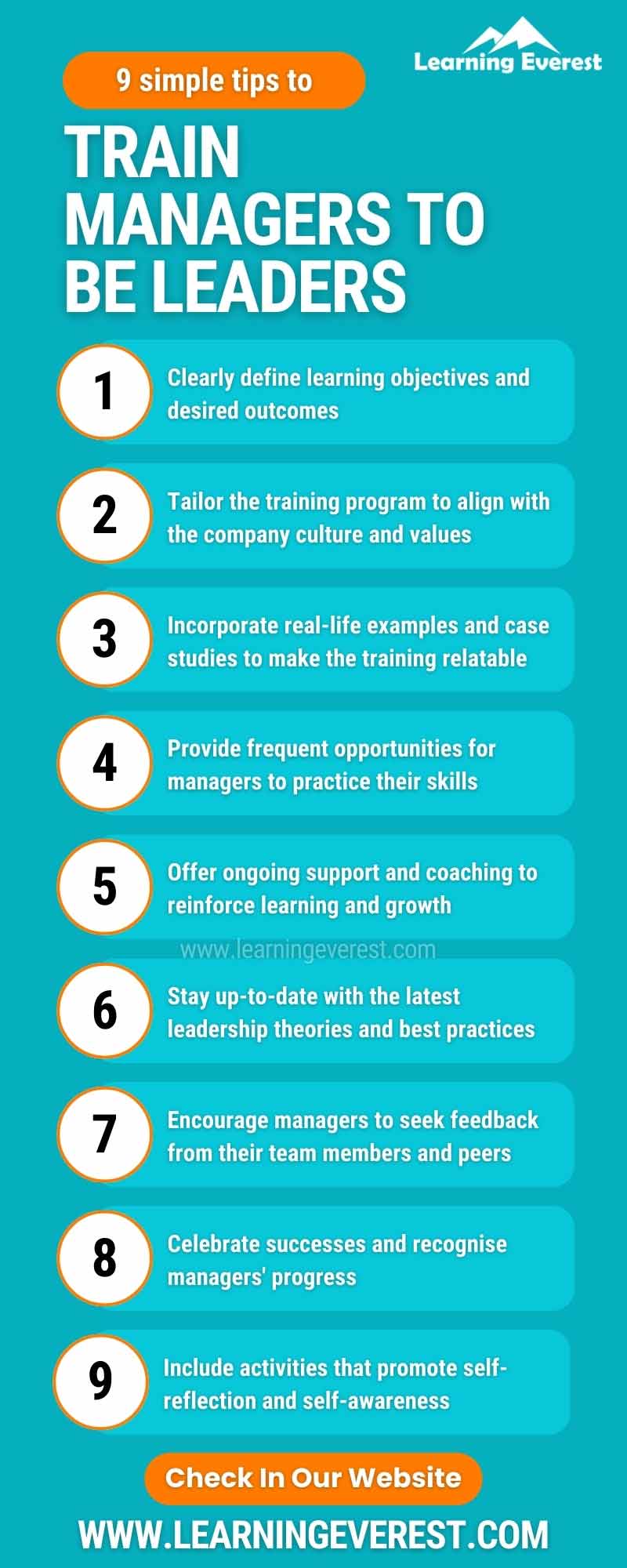Many professionals have the goal of one day serving in a managerial position. But becoming a manager is not just about putting in time with the experience of moving up the corporate ladder. It needs knowledge about both your role and industry. It also mainly calls for you to have hands-on management experience.
But how do you gain that experience if you have never held a management position? In lieu of direct management experience, finishing formal management training can be an enthusiastic means of showing enthusiasm and earning your employer’s trust.
Table of Contents
- What is the meaning of train managers to be leaders?
- What does it mean to train managers to be leaders?
- Key benefits of training managers to be leaders
- Common challenges new managers face
- Seven innovative training ideas to train managers to be leaders
- Infographic
- Knowledge Check!
- Frequently Asked Questions (FAQs)
- Q. What is the meaning of train managers?
- Q. Why is it important to train managers to be leaders?
- Q. What are some essential leadership skills for new managers?
What is the meaning of train managers to be leaders?
A manager training program is a professional training course offered by an institution or work organization that enables employees to learn and develop the managerial skills needed to work in a managerial position successfully. The skills you can learn in a management training course vary, such as:
- The capability to communicate clearly to keep your team members on task and working toward your organization’s strategic goals
- Ways to delegate and make authoritative decisions effectively when necessary without micromanaging the team members’ every action
- How to gather and interpret business data and analytics so you can take data-driven decision-making, back up your actions with hard facts, and use key performance metrics to communicate to key stakeholders
- Specific, but important skills related to conducting performance reviews, employee hiring, and resolving employee problems
Other training may delve into more specific challenges faced by managers, such as organizational change management, crisis management, and problem resolution. Some training programs will also teach leadership skills, such as how to engage with peers, motivate, and empower employees.

Why is it important to train managers to be leaders
What does it mean to train managers to be leaders?
While the two terms are often used interchangeably, it is important to note that management training programs differ from leadership training programs. Although there is some overlap in the task they do, there are key differences between the managers and leaders. While managers fill a specific role at an organization, anyone—regardless of their job description/title—can be a leader. Management training programs are designed mainly for professionals interested in managerial positions, while leadership training courses are suitable for early and mid-career employees, professionals, leaders, and entrepreneurs.
When combined with a management training course, leadership training can also be immensely valuable for the managers. Whether you are an aspiring manager, or a seasoned team leader, many employees can benefit from taking a management training course.
Key benefits of training managers to be leaders
While you can gain valuable on-the-job training sessions throughout your career, taking a training course can effect your skills and credentials. A management training program can provide you overcome situations that arise in the workplace by giving you to be more detail-oriented, training you how to ask the right knowledge, and strengthening your analytical and critical-thinking skills. The specific advantages of management training programs include:
- A deeper knowledge of the role of a manager
- Helpful feedback from experienced professionals
- Improved communication skills
- Refined decision-making skills
- The ability to manage organizational change
- Knowledge of how to implement training strategies, plans, and budgets
Some industries require standardized training systems, but the skills learned in management courses can be important to anyone who is hoping to be, or currently is, a leader/manager. Many leaders view those with certifications as professionals who are knowledgeable, not incapable, and eager to continue learning.
Common challenges new managers face
Transitioning into a managerial post can be challenging for individuals. New managers may face difficulties adjusting to their new responsibilities, building credibility, and earning the respect of their team members. Understanding and addressing these common challenges can help new managers thrive.
One key challenge that new managers often encounter is navigating office politics. As they move into a position of authority, they may find themselves caught in the middle of conflicts or power struggles within the team. Learning to diplomatically handle such situations while maintaining professionalism is crucial for new managers to establish themselves as influential leaders.
Another common hurdle for new managers is delegating responsibilities. Many individuals promoted to managerial positions struggle to let go of tasks they were previously responsible for, leading to micromanagement tendencies. New managers need to learn how to delegate effectively, empower their team members, and free up time to focus on strategic decision-making and leadership development.
Seven innovative training ideas to train managers to be leaders
Being an effective manager requires continuous learning and development. To help managers stay ahead in their roles, here are seven innovative training ideas that can enhance their skills and capabilities:

7 Training ideas to train managers to be leaders
Let’s discuss them in detail.
Tip no. 1 – Interactive workshops
Firstly, you need to organize engaging workshops. where managers can actively participate in discussions, case studies, and interactive exercises. These workshops will provide a platform for managers to learn from industry leaders/experts and share best practices. This encourages active participation. managers can gain practical insights and apply them to their work situations.
Tip no. 2 – Role-playing simulations
You can simulate real-life scenarios for managers to practice their decision-making and problem-solving skills. Role-playing simulations allow managers to develop their skills. It can be done in a controlled environment and receive constructive feedback. With different scenarios, managers can confidently enhance their ability to make critical decisions. This helps them handle challenging situations.
Tip no. 3 – Mentorship programs
You can also pair new managers with experienced leaders. They can provide guidance, support, and share their knowledge. Mentorship programs allow managers to learn from the experiences of senior leaders and gain valuable insights. Managers can receive personalized advice and develop their leadership capabilities through one-on-one interactions.
Tip no. 4 – Gamified learning platforms
You should utilize gamification techniques to make the learning and training process enjoyable and interactive. Like, incorporating quizzes, challenges, and rewards into training modules to enhance engagement and knowledge retention. By transforming training into a game-like experience, managers can stay motivated and participate actively in their development.
Tip no. 5 – Virtual Reality (VR) training
You can as well leverage VR technology to provide managers with immersive training experiences. VR simulations allow managers to practice skills in leadership in realistic scenarios, enhancing their decision-making abilities and confidence.
Tip no. 6 – Peer learning circles
Next is to facilitate peer learning groups where managers can share experiences, discuss difficult challenges, and learn from each other. These circles foster collaboration and enable managers to expand their perspectives through diverse insights. With peer-to-peer learning, managers can gain different perspectives and learn from the experiences of their peers.
Tip no. 7 – Blended learning programs
Last but not least, you should also create a comprehensive training program that combines various learning methods, such as
- in-person workshops,
- online courses, and
- self-study materials.
Blended learning provides flexibility and accommodates different learning preferences. With a mix of learning opportunities, managers can choose the best methods for them and tailor their development journey accordingly.
By incorporating these considerations into the training program, organizations can create a comprehensive and practical leadership development journey for their managers. Building strong leaders is not a one-time event but an ongoing commitment to growth and development.
Lastly…
Leadership is about inspiring people
Training managers to become leaders is vital for the success of any organization. Organizations can cultivate a strong leadership values that drives growth and success by understanding the difference between a leader and a manager, recognizing the importance of training new managers, and providing them with the necessary skills. Implementing innovative training ideas and following simple tips can help organizations design and deliver effective manager training courses. Remember, leadership is not only about management skills but about inspiring and empowering each others to achieve their full potential.
Infographic
Knowledge Check!
Frequently Asked Questions (FAQs)
Q. What is the meaning of train managers?
A. A manager training program is a professional training course offered by an institution or work organization that enables employees to learn and develop the managerial skills needed to work in a managerial position successfully.
Q. Why is it important to train managers to be leaders?
A. A management training program can provide you overcome situations that arise in the workplace by giving you to be more detail-oriented, training you how to ask the right knowledge, and strengthening your analytical and critical-thinking skills.
Q. What are some essential leadership skills for new managers?
A. Essential leadership skills for new managers include effective communication, emotional intelligence, active listening, empathy, conflict resolution, and the capability to motivate and inspire others.






